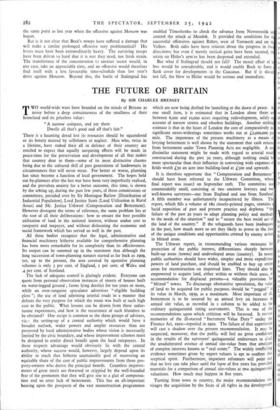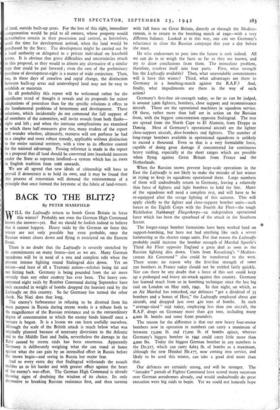THE FUTURE OF BRITAIN
By SIR CHARLES BRESSEY
TWO world-wide wars have branded on the minds of Britons as never before a deep consciousness of the smallness of their homeland and its priceless value:
" A narrow compass, and yet there Dwells all that's good and all that's fair."
There is a haunting dread lest its resources should be squandered or its beauty marred by selfishness or neglect. Men who, twice in a lifetime, have staked their all in defence of their country are entitled to expect that equally unsparing efforts will be made in peace-time for the preservation and development of all that makes that country dear to them—some of its most distinctive charms being due to the cultured skill of past generations of landowners in circumstances that will never recur. For better or worse, planning has since become a function of local government. The hopes held out by-planners after the last war have been very imperfectly realised, and the prevalent anxiety for a better outcome, this time, is shown by the setting up, during the past few years, of three commissions or committees, presided over by Sir Montague Barlow (Distribution of Industrial Population), Lord Justice Scott (Land Utilisation in Rural Areas) and Mr. Justice Uthwatt (Compensation and Betterment). However divergent the terms of reference, the same problem lies at the root of all their deliberations : how to ensure the best possible utilisation of land in the national interest, without undue cost to ratepayer and taxpayer, and without dislocating the economic and social framework which has served us well in the past.
All three bodies recognise that the legal, administrative and financial machinery hitherto available for comprehensive planning has been more remarkable for its complexity than its effectiveness.
Its output can be summed up in the statement that although the long succession of town-planning statutes started as far back as 1909, yet, up to the present, the area covered by operative planning schemes is only 5 per cent. of England, r per cent. of Wales and .4 per cent. of Scotland.
The lack of adequate control is glaringly evident. Everyone can quote from personal observation instances of streets of houses built on water-logged ground ; farms lying derelict for ten years or more, while an over-sanguine speculator advertises " eligible building plots "; the use of land adjoining arterial roads in a manner that defeats the very purpose for which the route was built at such high cost to the public. What lessons can be drawn from these unfor- tunate experiences, and how is the recurrence of such blunders to be obviated? One recipe is common to the three groups of advisers, viz.: the setting-up of a central authority which would have a broader outlook, wider powers and ampler resources than are possessed by local administrative bodies whose vision is necessarily limited by the civic boundary, and whose improvement schemes must be designed to confer direct benefit upon the local ratepayers. In these respects advantage would obviously lie with the central authority, whose success would, however, largely depend upon its ability to reach that hitherto unattainable goal of recovering an equitable share of the cost of public improvements from those pro- perty-owners who derive the principal benefit. Countless improve- ments of great merit are thwarted or crippled by the well-founded fear of the promoters that they will give rise to a glut of compensa- tion and an utter lack of betterment. This has an all-important bearing upon the prospects of the vast reconstruction programmes
which are now being drafted for launching at the dawn of peace. As one small item, it is estimated that in London alone there are between 6,000 and xo,000 acres requiring redevelopment, solely o account of narrow streets and obsolete buildings. Another striking estimate is that in the heart of London the cost of comparatively in- significant street-widenings sometimes works out at £2,000,000 per mile. The impotence of the present machinery as a means of levying betterment is well shown by the statement that cash returns from betterment under Town Planning Acts are negligible. A not dissimilar statement might be made with regard to arterial roads constructed during the past 20 years, although nothing could be more spectacular than their influence in converting wide expanses of fields worth £5o an acre into building-land at £5oo and upwards.
It is therefore opportune that " Compensation and Betterment" should have been referred to the Uthwatt Committee, whose final report was issued on September loth. The committee was commendably small, consisting of two eminent lawyers and two well-known surveyors—one from England and one from Scotland. A fifth member was unfortunately incapacitated by illness. The report, which fills a volume of 18o closely-printed pages, contains a lucid exposition of past and present practice and deplores " the failure of the past 20 years to adapt planning policy and methods to the needs of the situation " and to " secure the best social use of the land of the country." If the safeguards have been inadequate in the past, how much more so are they likely to prove in the face of the unique conditions and opportunities created by enemy action in blitzed areas.
The Uthwatt report, in recommending various measures for protection of the public interest, differentiates sharply between built-up areas (towns) and undeveloped areas (country). In towns public authorities should have wider, simpler and more expeditious powers of land purchase, and should be enabled to buy up entire areas for reconstruction .on improved lines. They should also be empowered to acquire land, either within or without their areas, as accommodation for displaced persons—a valuable provision for " blitzed " towns. To discourage obstructive speculation, the value of land to be acquired for public purposes should be " pegged " at its value in March, 1939, as a maximum. Most important of all, betterment is to be secured by an annual levy on increases in annual site value, as recorded in a column to be added to the ordinary quinquennial rating assessments. This is one of the recommendations upon which criticism will be focussed. It revives memories of the ill-starred " Increment Value Duty " under the Finance Act, two—repealed in 192o. The failure of that experiment will cast a shadow over the present recommendation. It may be suspected, moreover, that the public will feel no great confidence in the results of the surveyors' quinquennial endeavours to distil the unadulterated essence of annual site-value from that amalgam of complex interests known as "real estate." The widely conflicting evidence sometimes given by expert valuers is apt to confirm this sceptical spirit. Furthermore, impatient reformers will point out that no levy can take place until the lapse of five years has provided materials for a comparison of annual site-values at two quinquennial valuations. How much may happen in five years.
Turning from town to country, the major recommendation en- visages the acquisition by the State of all rights in the development of land, outside built-up areas. For the loss of this right, immediate compensation would be paid to all owners, whose property would nevertheless remain in their possession and control, as heretofore, until the time for development arrived, when the land would be purchased by the State. The development might be carried out by a local authority or delegated to a private individual on leasehold terms. It is obvious that grave difficulties and uncertainties attach to this proposal, as they would to almost any alternative of a similar type that could be put forward ; even the cost of the preliminary purchase of development-right is a matter of wide conjecture. Then, too, in these days of ceaseless and rapid change, the distinction between built-up areas and undeveloped land may not be easy to establish or maintain.
In all probability this report will be welcomed rather for the significant trend of thought it reveals and its proposals for minor adaptations of procedure than for the specific solutions it offers to the fundamental problems of betterment and development. These solutions, which incidentally do not command the full support of all members of the committee, will invite assault from both flanks— right and left ; and when the intricate complications are examined to which these half-measures give rise, many readers of the report will wonder whether, ultimately, recourse will not perforce be had to a simpler and more robust remedy, applicable without distinction to the entire national territory, with a view to its effective control for the national advantage. Passing reference is made in the report to a proposal that all land should be converted into leasehold interests under the State as supreme landlord—a system which has its roots in English tradition from ro66 onwards.
We are all agreed that new ideals of citizenship will have to prevail if democracy is to hold its own, and it may be found that this process of renovation will demand the reinstatement of a principle that once formed the keystone of the fabric of land-tenure.



























 Previous page
Previous page